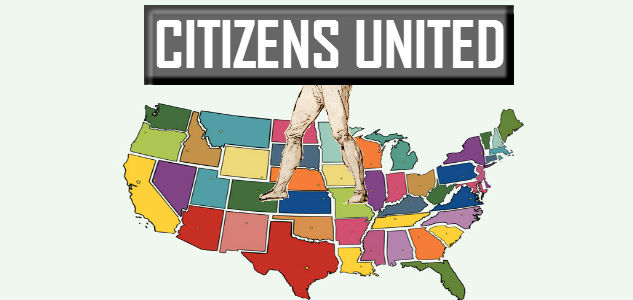
Citizens United Reversal Possible With Court Decision in Weeks to Impact on Money in Elections
Democracy, elections and voting at Democracy Chronicles
It is amazing how little press this is getting but the Supreme Court has an opportunity on June 14 to completely and immediately reverse the ridiculously dangerous Citizen’s United decision allowing unlimited and secret donations to election campaigns. Is this an opportunity for the democracy reform community to make an impact? How can protest and citizen action be used to influence the decision for democracy? If you have any thoughts, please comment below.
Thanks again to reformer Rick Hasen’s Election Law Blog for having the latest news on the subject. They had a link to the article called Big Money Corporate Spending in Elections May Lose in Supreme Court: Citizens United Ruling Faces Imminent Reversal, on the Eleventh Amendment Movement website. The Eleventh Amendment Movement is “nonpartisan political action association that was formed to employ 11th Amendment constitutional principles to specifically challenge the U.S. Supreme Court’s authority to hear an appeal in a case involving the State of Montana and Citizens United, the Court’s controversial 2010 decision that allows for unlimited corporate spending in state elections,” according to their website. Here is an excerpt from the article:
Citizens United, the controversial 2010 U.S. Supreme Court decision that allows for virtually unlimited corporate spending in state elections, may face an immediate effective reversal if the Court refuses, on 11th Amendment constitutional grounds, to hear a case involving Citizens United and the State of Montana. Reversal of Citizens United
The Eleventh Amendment Movement (TEAM, www.11thAmendment.org), a non-partisan political action association based in Hawaii, last week filed an amicus curiae “friend-of-the-court” brief that raises the 11th Amendment jurisdictional issue in the current case of American Tradition Partnership vs. Steve Bullock (Montana Attorney General). That case involves a recent Montana Supreme Court decision that upheld the state’s own anti-corruption election finance laws in defiance of the federally mandated Citizens United ruling. Montana’s decision has now been petitioned for appeal to the U.S. Supreme Court. The high court has not yet decided whether it will hear the appeal, but is expected to rule soon.
Election Law Blog also has an update on the issue in his post titled, “Montana Citizens United Sequel on SCOTUS Docket for June 14: What’s Next?” It is pasted here:
One potentially likely outcome is this: the Court decides to summarily reverse, and at least Justices Ginsburg and Breyer write a dissent from the summary affirmance. Justice Scalia (or another Justice) decides to issue a statement concurring in the summary reversal. If all of this happens, the Court’s term will likely end with no mention of the Montana case, because, with the crush of end-of-the-term opinions (including the high profile health care cases), these opinions won’t be written in time for the end of the term.
Election Law Blog also linked to the SCOTUSblog, SCOTUS being an acronym for Supreme Court of the United States, that first broke the story. SCOTUSblog’s About Us section describes the website’s mission as being “devoted to comprehensively covering the U.S. Supreme Court without bias and according to the highest journalistic and legal ethical standards. The blog is provided as a public service and is sponsored by Bloomberg Law.” Take a look at an excerpt from the article by Lyle Denniston:
The Supreme Court will consider the major sequel to its controversial ruling on campaign finance at the Justices’ private Conference on June 14, the Court’s electronic docket showed Tuesday. The case is American Tradition Partnership, et al., v. Bullock (11-1179). The Court will be considering a request to overturn, without briefing or argument, a Montana Supreme Court ruling that upheld a state law curbing the campaign spending of corporations in that state — a ruling that is said to conflict directly with the Justices’ 2010 ruling in Citizens United v. Federal Election Commission, allowing such spending.
If the Justices choose not to reverse that state decision summarily, they are likely to grant review and put the case over to the new Term starting October 1, with a decision likely after this year’s election. The state court ruling, in the meantime, is on hold, thus allowing corporations to spend freely in Montana in this year’s election cycle.
Recommended Citation: Lyle Denniston, Montana, detainee cases set, SCOTUSblog – https://www.scotusblog.com/2012/05/montana-detainee-cases-set/
Leave a Reply